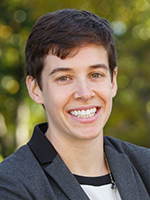Sarah Grant
2021 Temple Bar Scholar Report
 The Temple Bar Program provided an extraordinary opportunity to learn about legal institutions, processes, and culture in the United Kingdom and to meet with preeminent members of the bench and bar. As I transition from judicial clerkships into legal practice, I am thankful for the time I had during the program to think critically about the legal profession, to consider the differences between the US and UK legal systems, and to reflect on the consequences of those differences in the pursuit of justice.
The Temple Bar Program provided an extraordinary opportunity to learn about legal institutions, processes, and culture in the United Kingdom and to meet with preeminent members of the bench and bar. As I transition from judicial clerkships into legal practice, I am thankful for the time I had during the program to think critically about the legal profession, to consider the differences between the US and UK legal systems, and to reflect on the consequences of those differences in the pursuit of justice.
We had a busy first week together as a Temple Bar and Pegasus cohort, visiting the four inns of court, professional societies for barristers and solicitors, the Central Criminal Court, the Commercial Court, the Court of Appeal, and the Supreme Court of the United Kingdom. We also attended several evening receptions during which we were able to meet practicing barristers and solicitors.
During the second and third weeks, I shadowed barristers associated with the commercial chambers of Twenty Essex and XXIV Old Buildings. I had the chance to discuss day-to-day life as a barrister, observe opening statements for a five-week civil trial, sit in on case management conferences and meetings with co-counsel and instructing solicitors, attend arguments and judgment hand-downs in the Court of Appeal, Criminal Division, and review a variety of written materials relating to my hosts’ past and on-going matters. Of particular interest to me were several large international fraud disputes that generated related litigation in the United States. As discussed with the barristers I shadowed, for a variety of reasons, it is common for such fraud cases to give rise to parallel criminal proceedings in the United States and civil proceedings in London. Although I am entering government practice rather than commercial practice in the United States, I nevertheless found my time with Twenty Essex and XXIV Old Buildings immensely educational and rewarding. I am grateful to all the barristers and staff who made me feel welcome and generously gave of their time and attention.
In our fourth and final week, we were hosted by the Supreme Court of the United Kingdom, which is the final appeals court for cases arising out of England, Wales, Northern Ireland, and Scotland. (Northern Ireland and Scotland have separate legal institutions through the level of the intermediate appellate court). The UK Supreme Court is a relatively young institution, created in 2009 to replace the judicial committee in the House of Lords. The twelve justices of the Supreme Court also sit as members of the Judicial Committee of the Privy Council (JCPC), which hears appeals from UK overseas territories and a number of Commonwealth countries that have chosen to retain the JCPC as their final appellate court. Cases generally come to the UK Supreme Court on a by-permission basis, through a process similar to the United States Supreme Court’s certiorari process, and the justices hear argument in panels, usually of five members but sometimes more. During our week at the Court, we observed two JCPC appeals and one Supreme Court appeal and had the chance to discuss the cases with the justices and their judicial assistants (the UK equivalent of a judicial clerk). We also had the great privilege of dining with the justices on our last evening at the Court.
In addition to participating in the formal programming, we were able to enjoy all that London and the surrounds have to offer during our evenings and weekends. My highlights in this respect included visits to Bath, Cambridge, Greenwich, and the Brecon Beacons in Wales, attending dance and theater performances, and exploring the wonderful parks, museums, and markets of London.
In closing, I want to express my profound appreciation for the opportunity to spend time with so many kind and brilliant people—the American Inns of Court leadership, our hosts at myriad legal entities around London, and the other Temple Bar and Pegasus Scholars. It was my great honor and pleasure to be a part of this community during this once-in-a-lifetime experience.
Sarah Grant is a clerk for Judge Katherine Polk Failla of the U.S. District Court for the Southern District of New York. Previously, she clerked for Judge Diane P. Wood of the U.S. Court of Appeals for the Seventh Circuit. In 2019, Grant graduated cum laude from Harvard Law School, where she was editor-in-chief of the Harvard National Security Journal. An officer in the U.S. Marine Corps before and during law school, Grant served as an intelligence officer in Japan, eventually achieving the rank of captain, before transferring to the reserves and beginning her legal studies. She has a master’s degree in international relations from the University of Cambridge, where she was a Fulbright Scholar, and an undergraduate degree in international relations from the U.S. Naval Academy. In the fall, she will become an attorney in the Counterintelligence and Export Control Section of the U.S. Department of Justice’s National Security Division.